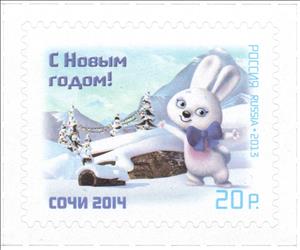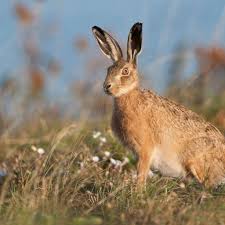Stamp: Zaika (dore hare), 2014 Winter Olympic mascot (Russia 2013)
Zaika (dore hare), 2014 Winter Olympic mascot (Russia 2013)
29 November (Russia ) within release 2014 Winter Olympic and Paralympic Games mascots goes into circulation Stamp Zaika (dore hare), 2014 Winter Olympic mascot face value 20 Russian ruble
| Stamp Zaika (dore hare), 2014 Winter Olympic mascot in catalogues | |
|---|---|
| Michel: | Mi:RU 1990 |
Stamp is horizontal format.
Designer: M.Rastorgueva.Also in the issue 2014 Winter Olympic and Paralympic Games mascots:
- Stamp - Snow Leopard, 2014 Winter Olympic mascot face value 20;
- Mini Sheet - 2014 Winter Olympic and Paralympic Games mascots face value 160;
- Mini Sheet - Snow Leopard, 2014 Winter Olympic mascot face value 160;
- Stamp - Bely Mishka (Polar Bear), 2014 Winter Olympic mascot face value 20;
- Mini Sheet - Bely Mishka (Polar Bear), 2014 Winter Olympic mascot face value 160;
- Stamp - Zaika (dore hare), 2014 Winter Olympic mascot face value 20;
- Mini Sheet - Zaika (dore hare), 2014 Winter Olympic mascot face value 160;
- Stamp - Ray of Light & Snowflake, 2014 Paralympic mascots face value 20;
- Mini Sheet - Ray of Light & Snowflake, 2014 Paralympic mascots face value 160;
Stamp Zaika (dore hare), 2014 Winter Olympic mascot it reflects the thematic directions:
Christmas or Christmas Day (Old English: Crīstesmæsse, meaning "Christ's Mass") is an annual festival commemorating the birth of Jesus Christ, observed most commonly on December 25 as a religious and cultural celebration among billions of people around the world. A feast central to the Christian liturgical year, it is prepared for by the season of Advent or the Nativity Fast and initiates the season of Christmastide, which historically in the West lasts twelve days and culminates on Twelfth Night; in some traditions, Christmastide includes an Octave. The traditional Christmas narrative, the Nativity of Jesus, delineated in the New Testament says that Jesus was born in Bethlehem, in accordance with messianic prophecies; when Joseph and Mary arrived in the city, the inn had no room and so they were offered a stable where the Christ Child was soon born, with angels proclaiming this news to shepherds who then disseminated the message furthermore. Christmas Day is a public holiday in many of the world's nations, is celebrated religiously by the vast majority of Christians, as well as culturally by a number of non-Christian people, and is an integral part of the holiday season, while some Christian groups reject the celebration. In several countries, celebrating Christmas Eve on December 24 has the main focus rather than December 25, with gift-giving and sharing a traditional meal with the family.
The modern Olympic Games or Olympics (French: Jeux olympiques) are leading international sporting events featuring summer and winter sports competitions in which thousands of athletes from around the world participate in a variety of competitions. The Olympic Games are considered the world's foremost sports competition with more than 200 nations participating. The Olympic Games are held every four years, with the Summer and Winter Games alternating by occurring every four years but two years apart.
The New Year is the time or day at which a new calendar year begins and the calendar's year count increments by one. Many cultures celebrate the event in some manner. In the Gregorian calendar, the most widely used calendar system today, New Year occurs on January 1 (New Year's Day, preceded by New Year's Eve). This was also the first day of the year in the original Julian calendar and the Roman calendar (after 153 BC)
Hares and jackrabbits are mammals belonging to the genus Lepus. They are herbivores, and live solitarily or in pairs. They nest in slight depressions called forms, and their young are able to fend for themselves shortly after birth. The genus includes the largest lagomorphs. Most are fast runners with long, powerful hind legs, and large ears to dissipate body heat. Hare species are native to Africa, Eurasia and North America. A hare less than one year old is called a "leveret". A group of hares is called a "husk", a "down", or a "drove".





